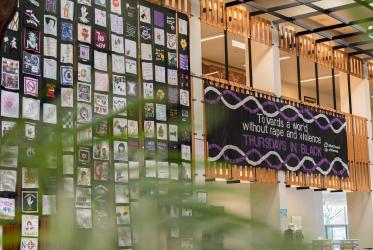By Annegret Kapp *
While violence against women is rampant in situations of war and oppression, women often take the lead standing up against injustice. The courage shown by mothers and grandmothers of the disappeared during Argentina's Dirty War period (1976-83) was described as an example and a challenge by WCC representatives recently.
For the general secretary of the World Council of Churches (WCC), Rev. Dr Olav Fykse Tveit, and senior members of his staff, it was an emotional experience to meet with human rights veteran Estela Barnes de Carlotto, president of the Association of the Grandmothers of the Plaza de Mayo in Argentina, when she visited Geneva, Switzerland on 31 August.
The Grandmothers group seeks justice for the 30,000 disappeared victims of state terrorism in Argentina and aims to reconnect children of regime opponents who were illegally adopted during that time with their true identities and their biological families.
The women who gathered each Thursday in Plaza de Mayo – a symbolic square in the centre of the Argentinian capital – to demand justice for their children and grandchildren were the first to draw attention to the human rights abuses of the military regime. Their weekly protest was an important inspiration for the "Thursdays in Black" campaign, recalled Dr Fulata Lusungu Moyo, WCC programme executive for the Just Community of Women and Men, at the meeting on 31 August.
This simple but profound campaign consists of a weekly display of commitment to a world without violence, especially violence against women. Wearing black clothes and a #ThursdaysinBlack pin, participants declare to be part of the global movement resisting attitudes and practices that permit rape and violence.
During the Ecumenical Decade of the Churches in Solidarity with Women (1988-98), several "Living Letters" teams representing the WCC visited Argentina and accompanied the demonstrations of mothers and grandmothers in Plaza de Mayo. In these and other encounters the teams witnessed that, while violence against women is pandemic, women also have special initiatives against violence, said the WCC gender expert Moyo.
The #ThursdaysinBlack movement, started during the Decade in Solidarity with Women, pays respect to the women’s resilience, agency and personal efforts to resist a culture of violence by combining the weekly protest on Thursday with the use of black as a colour of resistance, which it gleaned from women peace protesters in Israel and Palestine as well as the Black Sash movement in South Africa.
As the WCC general secretary said at the meeting with Carlotto, the #ThursdaysinBlack campaign is a good reminder of the violent reality faced by many in our world, especially by women and children. "We believe that this violence is something that can be changed," he added.
Tveit also told Carlotto he sees the courageous example set by her and the other grandmothers of Plaza de Mayo as a "challenge for us as men to also take up our role as grandfathers to work for the future of our grandchildren."
Carlotto took the opportunity to praise her husband and the other grandfathers as "silent heroes" because they accepted to stay at home caring for the family while the women went out to demonstrate. "They waited for us, never knowing if we would come home," she explained.
Indeed, the women didn't want their husbands, who would most likely have been arrested right away, to join the demonstrations. The grandmothers, on the other hand, were dismissed by the generals as "crazy women". They were able to take advantage of the gender prejudice of the military not taking them seriously – though some of the women became victims of forced disappearance themselves eventually.
Asked about her expectations towards the churches, Carlotto said that they should play a relevant, visible role in struggles for life following Christ's example who taught us to see the Other as our brother.
Read also:
In Argentina, stirring journey for human rights continues (WCC press release of 1 September 2017)
WCC member churches in Argentina
Blog post: A pilgrimage from Thursday to Thursday
* Annegret Kapp is one of the World Council of Churches' communication officers, specializing in social media and fellowship communication.








